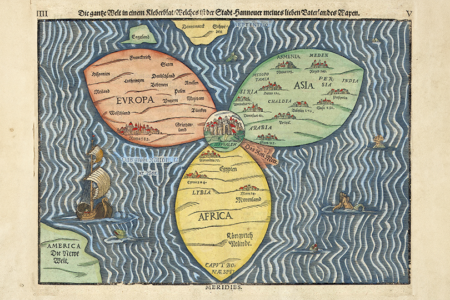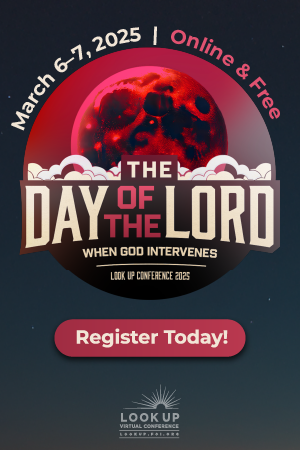Paradise Lost and Paradise Regained
The grand and central theme of the Scriptures from Genesis to Revelation is Salvation.
John Milton in his epic poem “Paradise Lost” describes the creation of Adam and Eve and their lives in paradise in perfect fellowship with their Maker and in harmony with their beautiful environment in the Garden of Eden. Milton then proceeds to narrate the baneful tale how Adam and Eve, tempted by the serpent, disobeyed God, and how this sin of disobedience and rebellion marred the harmony between them and their Creator and with all of nature.
Expelled from paradise, and torn by inner conflicts and frustrations, they were now exposed to a harsh and hostile world, yet always longing to return to their original habitat where they once enjoyed such great happiness and peace. This “original sin” profoundly affected, not only their own lives, but the destiny of their progeny. Sin and a bent to sinning became a determining factor in the lives of men. Not long after, the first murder was committed by their son Cain against his own brother Abel (Genesis 3).
Ever since, the story of man was largely written in letters of blood, tears and cruelty, in endless suffering and mutual oppression. It became apparent that man is a lost creature who is helpless to save himself. Only God in His infinite mercy and grace can stoop down to save him. This He actually did repeatedly in the story of the Old Testament, and above all when He sent His Son, our Lord Jesus Christ to redeem men.
The Hebrew term “yesha”—to save, and “yeshuah”—salvation, refers to every predicament in which man may find himself, and from which he needs to be rescued or saved. Mortal man is a weak creature, who is subject to disease and death, and to every manner of disaster. He either oppresses others, or is oppressed himself, he either is enslaved or he enslaves others, his life is in constant danger from the evil within him or without. In all these circumstances, he turns instinctively to God for salvation. The whole of the Hebrew Scriptures, especially the book of Psalms, are an eloquent expression of man’s never ceasing predicament and God’s unfailing grace.
Above all, deep in his heart, man realizes that he has transgressed the will of His God, and displeased Him. He needs God’s forgiveness, to be reconciled to Him, and restored to His fellowship. The confession of David reflects the innermost experiences also of our lives:—
Have mercy upon me, O God,
According to thy loving-kindness.
According unto the multitude of thy tender mercies,
Blot out my transgression.
Wash me thoroughly from mine iniquity,
And cleanse me from my sin.
For I acknowledge my transgressions
And my sins are ever before me.
Against thee, thee only, have I sinned
And done this evil in thy sight. . . .
Behold I was shaped in iniquity
And in sin did my mother conceive me. Psalm 51:1-5
The various institutions of the Old Testament were a sign of God’s eternal love and eternal concern for His people.
The law of Moses provided them with the spiritual and moral guidelines to teach them what a righteous and holy God expected of them.
The sacrificial system, ordained and described in this Law, pointed to the fact that they were a sinful people in constant need of forgiveness, and that the price of forgiveness involved the shedding of the blood of the innocent for the guilty. The sacrifices of animals pointed beyond, to a more sublime truth, that in the final analysis it was God Himself who paid the price of our forgiveness, and that He of His own will freely forgave. The only condition was that the sinner repent, and accept by faith the forgiveness offered by God.
For it is not possible that the blood of bulls and goats should take away sins;
Wherefore, when He (the Messiah) cometh into the world
He saith, Sacrifices and offerings Thou wouldest not, but a body hast
Thou prepared me.
Then said I, lo I come . . . to do Thy will, O God.
Hebrews 10:4-5, 7
The role of Aaron and his priestly descendants was to offer the sacrifices of the people to their God, and to be their intercessors and mediators, thus pointing by their functions to a God appointed supreme Mediator, who was to come in the person of the Messiah.
For there is one mediator between God and men, the man Christ Jesus
Who gave himself a ransom for all. 1 Timothy 2:5-6
A beautiful sign of God’s presence amidst His people was the Tabernacle in the wilderness, and later the Temple in Jerusalem. They presented tangible evidence of God’s presence among His people, at the same time pointing to Christ the living and loving presence of God among Israel and ultimately among all men. And so Christ was in His own person the living Word of God, the sacrifice and High Priest. (Hebrews 10:19-22)
This is why in the book of Isaiah the Messiah is called “Emmanu-el – God With Us” (Isaiah 7:14), or in the words of John the evangelist:
And the Word was made flesh, and dwelt among us,
And we beheld His glory, full of grace and truth. John 1:14
Just as in the Old Testament Scriptures, so also in the New Testament, written by Jewish men of God, “Salvation” is the main theme. There salvation, in Greek “soteria” is centered around the person of Jesus (in Hebrew Yeshuah), an abbreviation of the name Yehoshua, which means “Salvation is of the Lord.”
Behold an angel of the Lord appeared unto him in a dream, saying “Joseph thou son of David,
Fear not to take unto thee Mary, thy wife;
For that which is conceived in her is of the Holy Spirit.
And she shall bring forth a son, and thou shalt
call his name Jesus (in Hebrew Yeshuah) for he shall SAVE
His people from their sins. Matthew 1:20-21
This salvation can only be acquired by faith, and not by any merit or good works performed by man. It is always the grace of God which reaches down to us in our lostness and sinfulness to retrieve us, and never the result of man’s efforts or accomplishments.
Who hath saved us and called us with an holy calling,
Not according to our works, but according to his own purpose and grace,
which was given to us in Christ Jesus before the world began. 2 Timothy 1:9
Salvation Only Through Christ
There is no salvation in Judaism. First, because it does not recognize the tragic reality of man’s fallen condition and inability to lift himself out of the pit of sin. It persists in attributing to man the ability to perfect himself. It grossly underestimates the terrible reality of sin, which vitiates and, frustrates man’s best and most earnest efforts to overcome the forces of evil within him and and him.
On waking up in the morning, the little Jewish child is taught to pray:
“My God, the soul which thou hast given me it is pure.”
Unfortunately it is not. Somewhere in that little angel of a child, the tiger of sin is lurking, and soon enough it will definitely assert itself.
And God saw that the wickedness of man was great in the earth,
And that every imagination of the thoughts of his heart was only evil continually. Genesis 6:5
Believing in the basic goodness of man, Judaism depends on human works and efforts to build a brighter future for mankind. But while scientifically and technically man has made amazing progress, spiritually and morally he has regressed. One would think that of all people, the Jews would have learned from their own history and painful experience that man is not basically good, but depraved and in need of redemption. What we said of Judaism is equally true of all religions and philosophies which are based on “good works” and human perfectibility.”
Neither is there salvation in science or scientism, one of the chief idols of modern man. Science can be a useful tool to search out and to apply the laws of nature for the material benefit of men, yet, science wrongly applied by greedy or wicked men, may also become a monster and a tool of apocalyptic destruction for all of mankind and for all of nature. Today we ourselves are witnesses of this frightening phenomenon which threatens to destroy us all.
Nor is there salvation in Communism—this modern Moloch of our times, dialectic materialism, the philosophy of communism, recognizes only the material aspects of the universe and of man. It is completely blind to the spiritual nature of man, created by God for a high and eternal destiny. Because of this, it is always ruthless in dealing with men and relies on brute force. In their philosophy man is not an individual to be respected for his own self, but a cog in a wheel, which must serve the will of the party. Communism can only be imposed by force, and survives by the imposition of force. Free men reject communism as evil.
Neither is there salvation in democracy. Although we believe this to be the best form of government which the human mind has yet devised, superior to all other forms of government, it has an inherent weakness; it depends on frail, fallible, selfish human beings to make it work. Hence all the corruptions and deceptions to which all democracies are so prone; sometimes it may even appear to be worse than a dictatorship, where the fear of the ruthless rulers may keep some people from going beyond the bounds of common justice and decency. Democracy is good as long as it is run by good men.
There is no salvation in any man or human system. Salvation is only in Christ, who is the cornerstone of God’s Kingdom, and the foundation of our redemption. Man must be saved first of all from the power and dominion of sin and return to God and to a restored fellowship with Him.
The momentous confession which the apostle Peter made some nineteen centuries ago before the assembled leaders of Israel, still holds true today:
Neither is there salvation in any other;
For there is none other name under heaven given among men, whereby we must be saved. Acts 4:12







